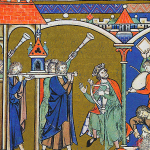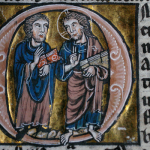Vatican City, Jan 24, 2017 / 06:02 am (CNA/EWTN News).- The Irish bishops are just finishing up their first ad limina visit to Rome in 10 years – a time that’s been marked by a rapid increase in secularism, the legalization of same-sex marriage and the country's tragic clerical sex abuse crisis. However, despite the vast array of challenges the Irish bishops currently face and the many hurdles they have already overcome, one topic stood out, and was mentioned in every single meeting they had with different Vatican departments: the role women in the Church today. “I would say I don't think there was any congregation that we didn't mention it,” Bishop Brendan Leahy of Limerick told CNA Jan. 20. He called the attention currently being given to women and their role “one of the signs of the times.” The Holy Spirit “is saying something,” Leahy said, adding that while exactly what the Holy Spirit wants is “the big question for us all,” one area that keeps coming up is engaging women more in decision-making processes. Bishop Leahy is just one of the many Irish prelates who gathered in Rome last week for their ad limina visit, which typically serves as a time of rest and prayer for bishops during which they meet with the Pope and have the opportunity to visit each of the Vatican departments. He was one of four bishops who spoke to journalists after their Jan. 20 meeting with Pope Francis, which lasted just over two hours and covered a wide range of topics. Other prelates who spoke were Archbishop Eamon Martin of Armagh in Northern Ireland and president of the Irish bishops' conference, Archbishop Diarmuid Martin of Dublin and Bishop Denis Nulty of Kildare and Leighlin. In his comments to CNA, Bishop Leahy noted that “women are so much at the heart of the Church in Ireland, they are very, very involved in the Church.” However, throughout the past 10 years of meetings, assemblies and, in his case, a diocesan synod, the bishops have been doing a lot of listening, and one thing they’ve consistently heard from women is they want their role to be “more greatly enhanced,” visible, appreciated and articulated. This is a reflection they brought up with each of the Vatican dicasteries they visited, as well as with the Pope, who “recognizes that it is a serious issue.” Leahy said that during their meeting with the Pope, led as a conversation with no prepared text, Francis pointed to Swiss theologian Hans von Balthasar, which has done in the past, offering reflections on two specific dimensions in the Church: the Petrine and the Marian. “Peter, Mary...these two profiles. Because they are complimentary,” he said. “Women bring their way of seeing things, their way of understanding, their way of feeling about issues, their distinctiveness into the life of the Church.” While the topic itself and what it means for the work and life of the Church requires more reflection, “we need to appreciate” the specific qualities that women bring, and “we need to see how we can articulate that more.” However, referring to Pope Francis' advice, Leahy cautioned that while the enhancing the role of women must be pursued, it shouldn’t be approached from a “simply functionalistic perspective.” “We can't just come up with simplistic solutions, and I think women themselves would be the first to say that,” he said, explaining that the next step is to explore together “how best to articulate the life of the Church in such a way that women will feel that their role is genuinely appreciated.” The bishop said that after their meetings in the Vatican, he feels that their concern about the topic “has been heard,” and “to be fair, we’re not the only ones saying it.” Pope Francis himself often says the role of women is something the entire Church needs to look into, he said, explaining that for he and his fellow bishops in Ireland, they will head back with plans for “a tremendous engagement” based on listening and dialogue. Referring to Pope Francis’ constant emphasis on the importance of discernment, Leahy said there’s no quick solution, but it’s something that “needs time, it needs reflection, it needs exploration to discern together.” Archbishop Diarmuid Martin of Dublin echoed Leahy’s sentiments, telling journalists that one of the “most alienated groups” in Ireland is “young women.” He said that specifically in their meeting with the Congregation for the Doctrine of the Faith, they discussed the areas in the Church where “a stronger position” of not only women, but laypeople in general, “is not only licit, but is desirable.” Other issues touched on by the bishops in their meeting with the Pope were youth, vocations, the influx of refugees to the country, and of course the Pope’s upcoming visit to Ireland in 2018 for the World Meeting of Families Although the bishops’ visit comes in wake of the abuse scandal that rocked the country and a rapid increase in secularization, Archbishop Eamon Martin said none of the bishops felt “under investigation” or interrogation during the ad limina. It was “a very different atmosphere,” particularly in their meeting with the Pope, which he called a “fascinating encounter.” “We haven’t received any raps on the knuckles,” but were rather assured that they are “not alone” in the challenges the face, many of which stem from the fact that the voice of the Church and her authority in society and in the lives of individuals has taken a drastic dip, in large part due to the abuse scandal. Archbishop Diarmuid said the bishops “are realistic about the challenges we are facing in Ireland at the moment,” but are also hopeful that they are moving to “a new place of encounter and dialogue” in Irish society where the Church has an important voice. “Not the dominating voice or domineering voice that perhaps some say we’ve had in the past – but we are contributing to important conversations” on topics such as life, marriage, family, poverty and education. Discussion also focused at length on how to be a bishop, with the Pope comparing their role to a goalkeeper, “and the shots keep coming from everywhere, and you stand there ready to take them from wherever they come.” While there was “a fair bit of laughing and joking,” the bishops all got very serious when talking about abuse. Archbishop Martin said the number of abuses in Ireland “was small compared to society at large,” and noted that the Church has made significant progress since the scandals came out. Referring to their meeting with the Pontifical Commission for the Protection of Minors, Archbishop Eamon Martin pointed to a four-step model Benedict XVI recommended to them when the abuse scandal first broke out in the country: to establish the truth of what happened, put preventative procedures into place, to adhere to justice and to bring healing. “We’ve been working in all four areas,” he said, noting that in the healing process for those abused, “to have their story told” makes a big difference. Ireland is “now speaking from a sense of maturity” and can be a reference point to the rest of the Church from their position, he said, noting that as he was speaking a new report was published in Belfast by leaders of the Historical Institutional Abuse Inquiry in Northern Ireland on the abuse of children in residential institutions, some run by Catholic religious orders. Overall there was a recognition that Ireland had gone “through a bad time – not for us, but particularly for children who were abused,” he said, adding that there was also an acknowledgment that “anything that we did would inevitably be inadequate in responding to the suffering they experienced.” Read more















